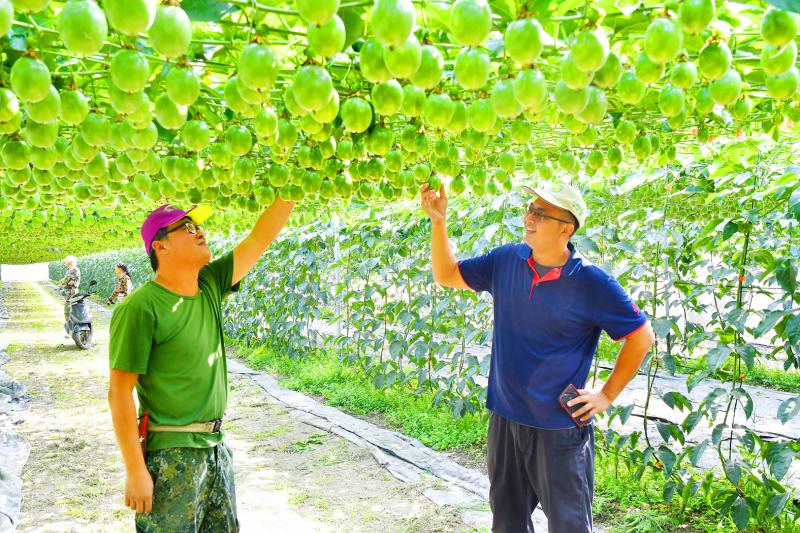Taiwanese will no longer have to wait until summer to buy passion fruit at local markets, thanks to lighting technology developed by a government-run agricultural technology research facility in southern Taiwan.
Passion fruit farming totals 809 hectares, including 604 hectares in Nantou County, mainly in Puli Township (埔里).
With the harvest lasting from July to September, the sweet seed-filled fruit is only available in markets from July to January the following year, the Council of Agriculture said.

Photo courtesy of the Kaohsiung District Agricultural Research and Extension Station via CNA
However, starting this year, the tropical fruit would be available all year, the council’s Kaohsiung District Agricultural Research and Extension Station told a news conference in Taipei on Tuesday.
Over the past three years, the station has instructed orchard operators in Kaohsiung, Tainan and Pingtung County on how to grow passion fruit in mesh houses, using artificial lighting as a substitute for sunlight, the station said.
Thanks to illumination adjustment technology developed by the station, and its know-how in orchard preparation and mesh house pollination techniques, passion fruit growers in the south are able to pick ripe fruit from February to June, before their counterparts in Puli begin their harvests in July, it said.
“Technological research and development allows Taiwan to harvest passion fruit even in the spring,” the station said.
An estimated 100 hectares of the new “spring passion fruit” have been planted in Kaohsiung and Pingtung, with an expected annual output of 2,000 tonnes, data from the station showed.
Growers of spring passion fruit begin to prepare the soil and plant seedlings in September and October, but with the aid of artificial lighting, they are able to harvest from February to June the following year, said Lee Wen-hao (李文豪), an assistant researcher at the research station.
This also ensures the harvest is not affected by typhoons and monsoon rainfall, which are most prevalent from July to September in Taiwan, he said.

ECHOVIRUS 11: The rate of enterovirus infections in northern Taiwan increased last week, with a four-year-old girl developing acute flaccid paralysis, the CDC said Two imported cases of chikungunya fever were reported last week, raising the total this year to 13 cases — the most for the same period in 18 years, the Centers for Disease Control (CDC) said yesterday. The two cases were a Taiwanese and a foreign national who both arrived from Indonesia, CDC Epidemic Intelligence Center Deputy Director Lee Chia-lin (李佳琳) said. The 13 cases reported this year are the most for the same period since chikungunya was added to the list of notifiable communicable diseases in October 2007, she said, adding that all the cases this year were imported, including 11 from

Prosecutors in New Taipei City yesterday indicted 31 individuals affiliated with the Chinese Nationalist Party (KMT) for allegedly forging thousands of signatures in recall campaigns targeting three Democratic Progressive Party (DPP) lawmakers. The indictments stem from investigations launched earlier this year after DPP lawmakers Su Chiao-hui (蘇巧慧) and Lee Kuen-cheng (李坤城) filed criminal complaints accusing campaign organizers of submitting false signatures in recall petitions against them. According to the New Taipei District Prosecutors Office, a total of 2,566 forged recall proposal forms in the initial proposer petition were found during the probe. Among those

The Mainland Affairs Council (MAC) today condemned the Chinese Communist Party (CCP) after the Czech officials confirmed that Chinese agents had surveilled Vice President Hsiao Bi-khim (蕭美琴) during her visit to Prague in March last year. Czech Military Intelligence director Petr Bartovsky yesterday said that Chinese operatives had attempted to create the conditions to carry out a demonstrative incident involving Hsiao, going as far as to plan a collision with her car. Hsiao was vice president-elect at the time. The MAC said that it has requested an explanation and demanded a public apology from Beijing. The CCP has repeatedly ignored the desires

The Ma-anshan Nuclear Power Plant’s license has expired and it cannot simply be restarted, the Executive Yuan said today, ahead of national debates on the nuclear power referendum. The No. 2 reactor at the Ma-anshan Nuclear Power Plant in Pingtung County was disconnected from the nation’s power grid and completely shut down on May 17, the day its license expired. The government would prioritize people’s safety and conduct necessary evaluations and checks if there is a need to extend the service life of the reactor, Executive Yuan spokeswoman Michelle Lee (李慧芝) told a news conference. Lee said that the referendum would read: “Do